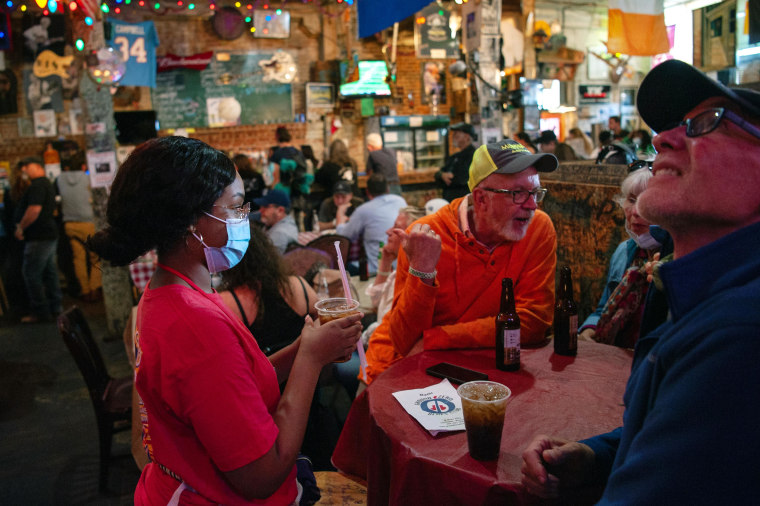A surprising state has been named the healthiest in the nation in 2020.
For the first time in years, Hawaii didn't top digital health company Sharecare's Community Well-Being Index, which was released on Tuesday morning. Instead, Massachusetts made a surprise appearance at the top of the list. Hawaii came in second, followed by New Jersey, Maryland and New York.
The rankings, which have been shared every year since 2008, look at social determinants of health like access to health care, food, housing, transportation and personal health risk factors including physical health, community and social bonds, financial management skills and strength of purpose in daily life. To make the list, researchers from Sharecare and the Boston University School of Public Health assessed more than 450,000 respondents across all 50 states.
Download the NBC News app for full coverage of the coronavirus outbreak
Senior vice president and head of the Community Well-Being Index at Sharecare Elizabeth Colyer said that she was interested to see Massachusetts take the crown from Hawaii, noting that Hawaii had financial concerns tied to the coronavirus pandemic and the lack of tourism to the state that may have impacted its score.
Massachusetts, however, did particularly well in the social determinants of health categories, and was ranked No. 1 for health care access, No. 2 for housing and transportation and seventh for food access.
"We know that those key social determinants of health in a year like 2020, having that strong access to infrastructure and health care resources is oftentimes a protective factor when it comes to individual well-being," said Colyer. "In a year where we recognize more than ever the importance of place, the importance of our surroundings and our environment ... Those insulating protective factors and those key social determinants of health were incredibly important in Massachusetts achieving its No. 1 ranking for the first time in index history."
Top 5 healthiest states
1. Massachusetts
2. Hawaii
3. New Jersey
4. Maryland
5. New York
Many of the top five healthiest states, with the exclusion of Hawaii, were grouped in the Northeast part of the country. Colyer said it's not unusual to see this sort of regional trend, although she noted that this year's list was a little more "concentrated."
"The Northeast, this year, performed extremely well," she said.
According to the report, residents in the top-ranked states have lower-than-average individual health risk factors, and say that they enjoy supportive relationships with other people, have the tools to manage and increase their financial security regardless of income, and have access to high-quality health care and jobs.
The report showed that despite the pandemic, community well-being nationwide remained "essentially unchanged" thanks to steady individual health risk factors: Physical well-being significantly increased over the course of the year, and Americans saw positive trends in the strength of their personal relationships even as financial well-being decreased.
"Across the board, Americans were resilient throughout 2020," Colyer said.
In lower-ranked states, though, researchers found that people had worse access to social determinants of health and more individual risk factors like lower levels of connection to the community and lower levels of physical resilience. The less healthy states were also more likely to be in counties considered rural, and often were areas that had struggled with recent changes like hospital closures and health care access. This was Mississippi's second year in a row in last place.
The 5 unhealthiest states
46. Kentucky
47. West Virginia
48. New Mexico
49. Arkansas
50. Mississippi
Like the top five states, many of the lowest-ranked states were geographically concentrated, this time in the South. In addition to the individual and societal health factors that the study measured, Colyer said that COVID-19 had also had a major impact in these areas.

"There's certainly a relationship noted between community resilience and COVID measures that we were tracking throughout 2020," Colyer said. "... We do see that these states that are falling in the bottom generally have a higher percentage of rural counties or counties considered rural, which saw later COVID-19 impacts, but broadly experienced greater impact when it came to, not only the likelihood of getting COVID-19, but also a higher likelihood to die from it."
Colyer said that she hopes the pandemic inspires lower-ranked states to reevaluate the way they manage health for their communities.
"2020 has reinforced that critical connection between health and wealth, between individual health and health tied to places in our surroundings," Coyler said, noting that the index has a particular focus on "continuing to map" potential solutions, like ensuring access to housing and transit or health care facilities. "We're really excited about how these data establish a new baseline ... and how we can point to these individual and community-based solutions and ensure that we can recover from this pandemic."
Follow NBC HEALTH on Twitter & Facebook.